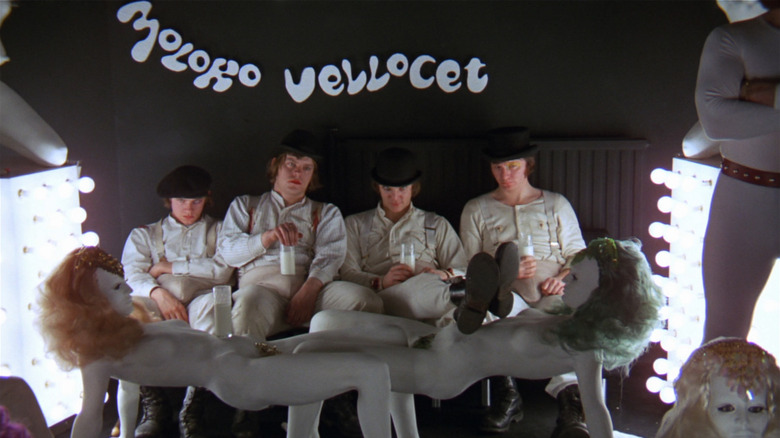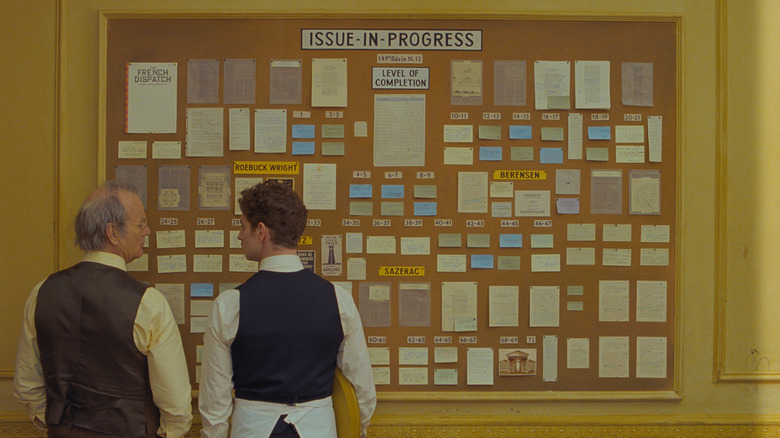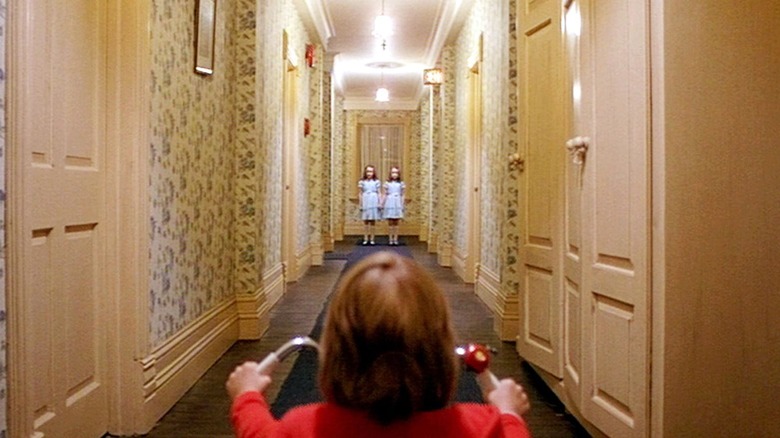
Lots of directors cite Stanley Kubrick as their biggest inspiration, and Wes Anderson is no exception. In fact, the filmmaker has said that he is "pretty influenced by Kubrick," who is "one of his favorites" (via Far Out). Anderson's frequent collaborator Bill Murray testified to the director's Kubrick obsession in an interview with Charlie Rose.
Anderson "doesn't really know where he's stealing anything from" by the time he makes his movies, but his films definitely bear an aesthetic comparison to Kubrick's. Both filmmakers are known for surreal, grandiose sets, like in Anderson's "The Grand Budapest Hotel" and Kubrick's "A Clockwork Orange." Anderson also borrows Kubrick's symmetrical and centered compositions from films like "The Shining," and uses them in his own films, like "Rushmore."
Kubrick is much more than just an aesthetic influence for "The Royal Tenenbaums" director. Anderson also emulates his idol's filmmaking philosophy in his own work. In this way, the two artists have even more in common than meets the eye.
Their Films Aren't Abstract Political Commentary

"The French Dispatch" director doesn't wish to "shape" the world with his movies or even to comment on it, he told Time. Instead, his movies are surreal worlds unto themselves, like the cozy island of "Moonrise Kingdom" or the unpredictable oceans of "The Life Aquatic with Steve Zissou."
The settings in Kubrick's films have the same quality, like the haunted hotel in "The Shining" and the lonely spaceship in "2001: A Space Odyssey." "I'm sort of quoting Stanley Kubrick, but when I do a movie, all I want to do is make an experience that can be as strong a version of whatever it is as it can be," Anderson says.
Like Anderson, the "Eyes Wide Shut" filmmaker also preferred to keep social commentary out of his work. Kubrick found political issues like the atomic bomb to be "as abstract as the fact that we are all going to die some day," he explained to Chess Hustler (via No Film School). The legendary director believed that "it is very rare to find anyone who can become emotionally involved with an abstraction," and that instead "people react primarily to direct experience."
Kubrick created visceral and unique viewing experiences for his audience. He preferred this over commenting on politics through abstract symbolism. Anderson would ultimately come to embrace this philosophy in his filmmaking as well.
These Are Cinematic Experiences Beyond Explanation

Rather than dive into the dialectic meaning behind his films, Anderson prefers to let the work speak for itself. "I don't really like any explanations," the director told Time. Instead, he prefers to allow the audience to form unique interpretations of his films, where "everybody's taking it a different way and everybody's right in a way." He shares David Lynch's disdain for explaining his films and runs into translation errors between cinematic language and English.
Anderson doesn't approach his work with the intention of sending a subtextual message — there is no hidden meaning, only the raw viewing experience. The symbolic meanings that people read into his films are totally subjective, and the same can be said for Kubrick's work.
This is what gives their films such a widespread appeal. They don't need to be analyzed to be understood, the understanding comes from the viewing experience itself. This is why both directors have enjoyed such long and storied careers as fixtures of the movie industry. Their films are inventive and surreal, but everyone can enjoy them.
Read this next: 12 Shows Like Stranger Things You Definitely Need To Stream
The post Wes Anderson And Stanley Kubrick Have One Important Trait In Common appeared first on /Film.
0 Comments